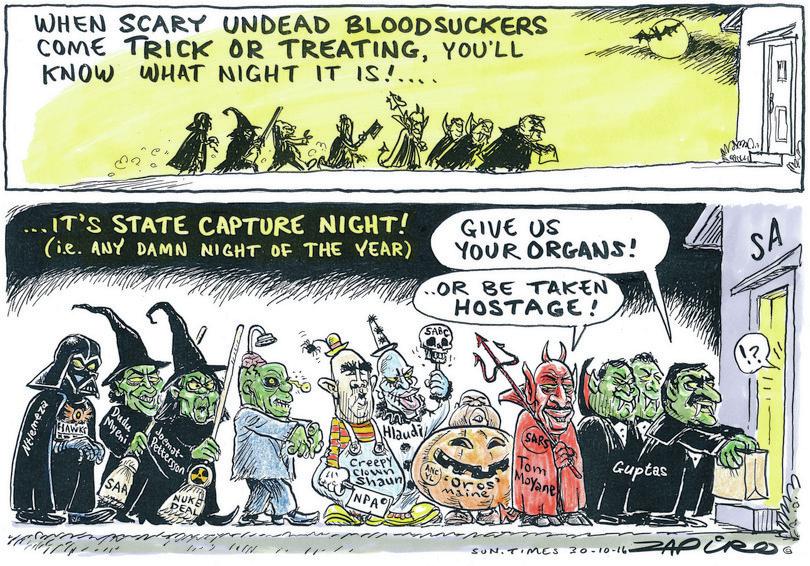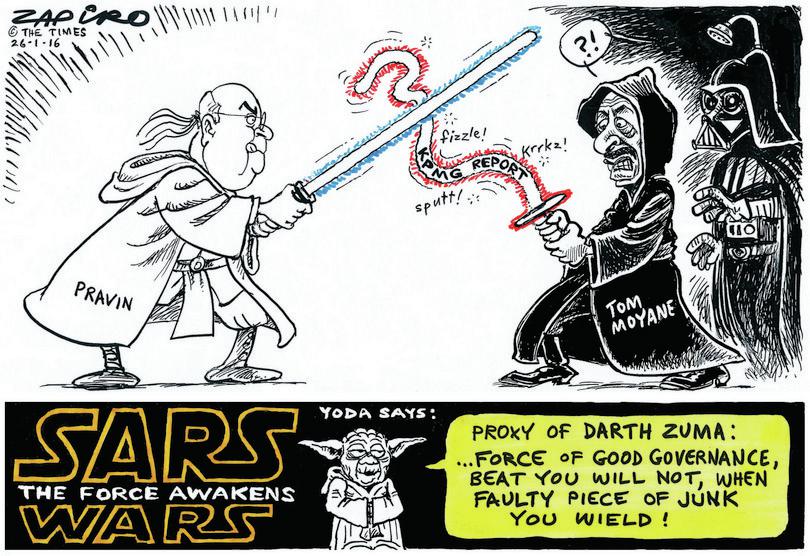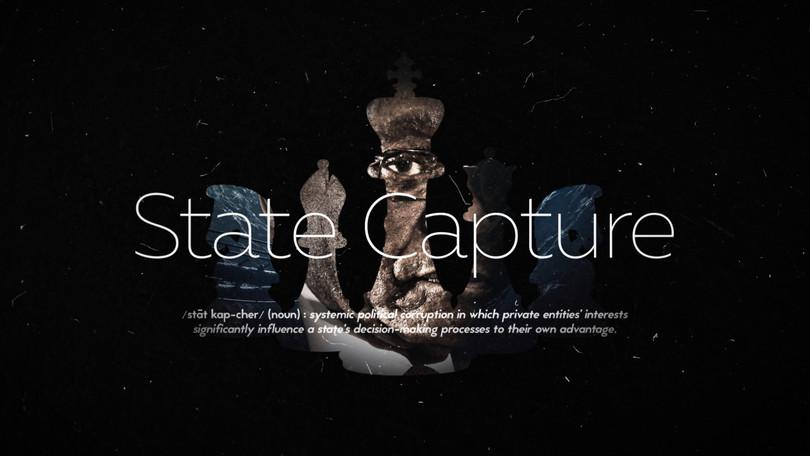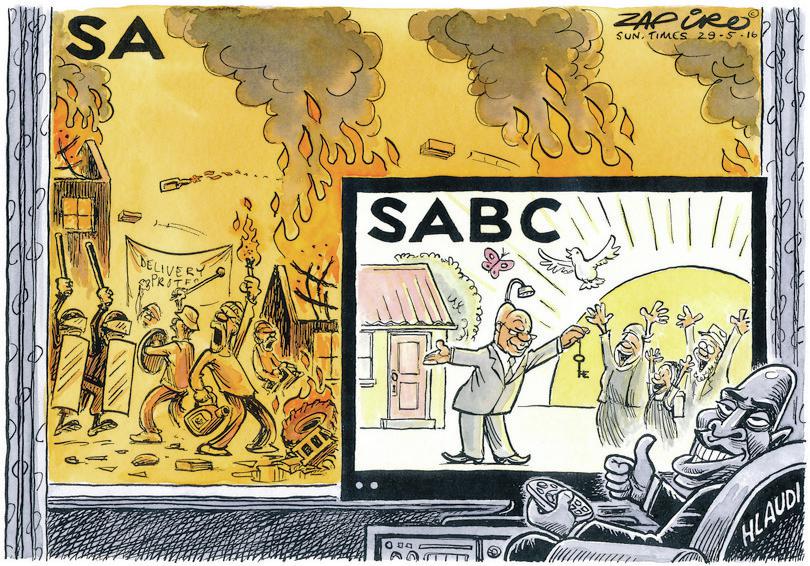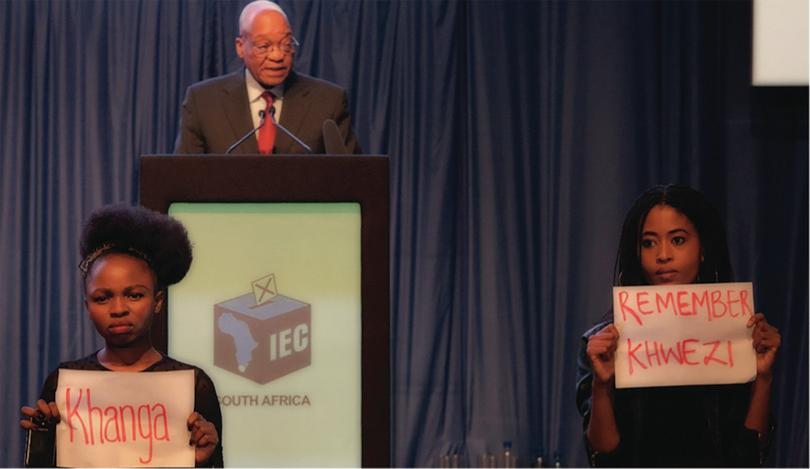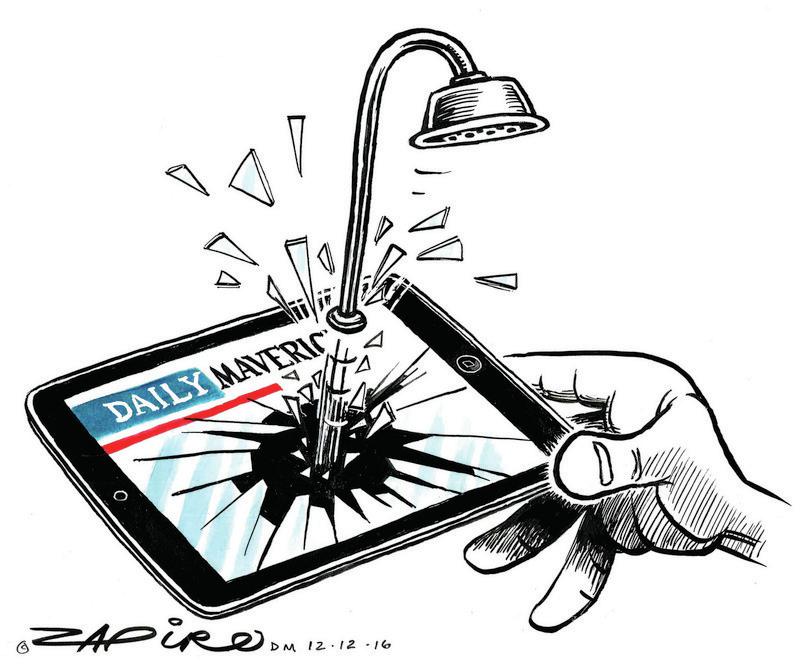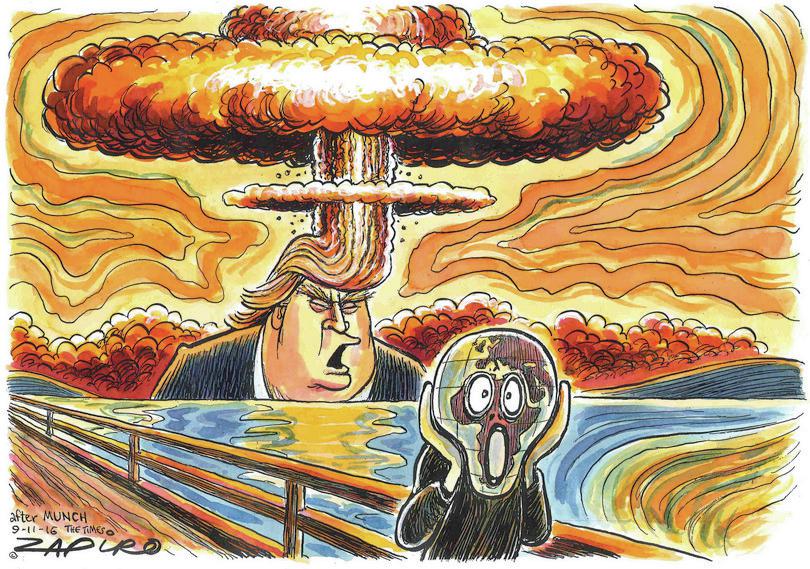The kakistocracy
The second decade of the 21st century, in other words, had already provided South Africans with enough action for a lifetime. But 2016? That year was another order of magnitude – for the world.
Leonard Cohen, Muhammad Ali, George Michael, Gene Wilder, Prince, Harper Lee, Alan Rickman and David Bowie all breathed their last. Britain voted to leave the European Union, unleashing the spectre of Brexit. Syria exploded. The Zika virus spread across South and North America. Fake news was everywhere. And lest we forget: Donald Trump became the 45th president of the United States.
For South Africa, too, there was little respite. In fact, the worst was yet to come for a kleptocracy at the peak of its powers.
“Still, 2016, 2017 and 2018 will one day be seen as probably the proudest years of not only Daily Maverick, but also of journalism in South Africa,” Branko says. “Government was completely captured. The courts were hamstrung by a non-existent NPA.” It was, he believes, essentially the media and civil society who “kept the lights on” during this dark period.
When the Zondo Commission of Inquiry into State Capture would begin its seemingly interminable hearings in 2018, Judge Raymond Zondo would sometimes seem overcome by the scale of the graft his inquiry was helping to expose.
“How did all of these things happen?” he once asked, shaking his head slowly in bemusement. “What is it that, as a country, we got wrong?”
These are the questions that South Africa has been wrestling with. Sometimes it’s tempting to imagine the capture of the state going down in the manner of a Hollywood movie.
At a secret coven of rogues in the bunker of his Nkandla lair, Zuma – stroking a bald cat named Hlaudi – sits in a huge, wing-backed, black rhino-hide chair. Around the table in front of him are all the ministers fingered in State Capture: David Mahlobo, Mosebenzi Zwane, Des van Rooyen, Bathabile Damini, Malusi Gigaba, Lynne Brown, Faith Muthambi, and many more.
Scattered among them are provincial mafia bosses like Supra Mahumapelo and Ace Magashule, commissioners like SARS’s Tom Moyane and the Hawks’ Berning Ntlemeza, and parastatal bosses like Brian Molefe, Matshela Koko and Dudu Myeni. Also present: a phalanx of shady business-douches, PR goblins and grubby fixers like Gavin Watson, Iqbal Surve, Eric Wood, Victoria Geoghegan, Mzwanele Manyi, Roy Moodley, Thoshin Panday and Fana Hlongwane.
“Silhouetted behind Zuma, taking turns whispering in his ear, are the three Gupta brothers Ajay, Atul and Tony – as well as Zuma’s playboy son, Duduzane, who sits on the floor playing with toy replicas of the Waterkloof wedding jet and a blood-stained Porsche.”
Silhouetted behind Zuma, taking turns whispering in his ear, are the three Gupta brothers Ajay, Atul and Tony – as well as Zuma’s playboy son, Duduzane, who sits on the floor playing with toy replicas of the Waterkloof wedding jet and a blood-stained Porsche.
Further back from the table, in the standing-room-only section, is every single ANC MP who, while maybe not directly involved in each corrupt Zupta act, chose to tow the party line and defend Zuma at every turn. The resistance, if it could ever be called that, is in tatters. All that remains of ministers like Nhlanhla Nene and ANC MPs like Derek Hanekom, Joel Netshitenzhe and Makhosi Khoza who either challenged or did not comply with Zuma’s wishes, is a puff of cartoon smoke above the trapdoors they’ve dropped into.
Visible from the bunker’s lone periscope, Black First Land First’s Andile Mngxitama chases security chickens around the firepool astride a small plastic motorbike. Resplendent in Pep Store military outfits, Kebby Maphatsoe and Carl Niehaus play a listless game of swingball. Someone has scrawled “Thuli” on the tethered ball.
From this hypothetical axis of Zupta evil, it’s easy to imagine Zuma as a genius criminal mastermind, giving his underlings orders that benefit his Saxonwold succubi, the greater Zuma clan and the patronage network that gave them power. But was it ever anything like that? What did it really look like in the boardrooms, antechambers, business-class seats and luxury German sedans of corruption’s true reality show?
That they were effectively operating as an organised crime network is undeniable, but how organised were they as criminals? Did they really coordinate like that? Did each of them know about the others? Was there an understanding of who was a “Zupta” and who was not? Did they communicate by whispers, WhatsApp groups, a mailing list or safe words? Secret handshakes?
Branko believes that while there might not have been “Zupta employee of the month” awards, or a leaderboard charting the top achievers in tender kickbacks, there was an undeniable level of collusion.
He says: “Zuma managed to do a job that Trump would be envious of. He managed to change the shape of the fundamentals of the South African state. I don’t think they had a secret handshake or team-building meet-ups. I do know that they knew what the others were doing, that the coordination was there. They knew who was who. Zuma did not have to directly do anything: he had people to do it for him. Different people were there for different things. And they had different types of loyalty. Ace Magashule and Supra Mahumapelo were medieval dukes who had their duchies and were paying dues or rent to the king, whereas people like Faith Muthambi were servicing the Guptas, because Zuma was a partner in that.”
Branko continues: “Some of them were trying to play all sides, trying to serve the Guptas but still ‘officially’ be clear. All of them had handlers. Take someone like Lynne Brown: her handler was Kim Davids, her PA. Her PA was literally controlling her. I’m sure some of them had the delusion that they were just doing their job and what they were doing in terms of State Capture was just something the president needed that was good for the country, but I doubt that many of them were deluding themselves by thinking they were doing good stuff. It was just plain evil.”
Zapiro defends the truth
In 2016, South Africa’s greatest cartoonist Zapiro was producing cartoons for Tiso Blackstar’s since-discontinued daily newspaper The Times. At the end of January, he drew Pravin Gordhan in a “SARS Wars” battle against the dark forces of Tom Moyane and a Zuma Vader.
Zapiro says: “I deliberately used ‘SARS Wars’, which is what Daily Maverick was saying. The issue was all around the KPMG report, which was completely faulty. I sent it through in rough form and they replied, ‘Lovely, great cartoon.’ I replied, ‘Have you looked at it? Properly? It’s the complete opposite of what the entire [Tiso Blackstar] group is saying.’”
His editor went back and conferred with the Sunday Times. Then Zapiro received a phone call, asking: “Can you take the KPMG report out?”
Says Zapiro: “And I said, ‘No, absolutely not. The KPMG report is the single lynchpin of the whole setup. It’s what’s being used by Tom Moyane, Zuma and by Sunday Times reporters to tell this nonsense story. You know as well as I do that this is all going to come out and be shown as false. I can’t change that drawing, I won’t. You’re the editor so you’ve the prerogative whether or not to publish it.’”
They published it – but the incident spelled the beginning of the end for Zapiro at The Times. Thankfully for all involved, there was a digital start-up that had gained significant momentum and which, more importantly, shared the same values as the cartoonist.
Marikana déjà vu
Veteran parliamentary reporter Marianne Merten joined the Daily Maverick posse at the beginning of the year. It was another significant win for the team.
Branko says: “Marianne Merten is probably the best true reporter we have, an old hack in the best possible tradition. She never gives up and consistently delivers the you-can-take-it-to-the-bank factual reporting. She knows the law and the workings of Parliament better than anybody else within those walls. The recent firing of the Secretary to Parliament Gengezi Mgidlana was a direct consequence of Marianne’s tenacity.”
In the wake of Marikana and years of complaints about police brutality, Merten’s first story reported on the police watchdog’s response to complaints of torture, rape, deaths and systemic corruption within SAPS.
“Acting national police commissioner Lieutenant-General Khomotso Phahlane has been talking a lot about the SAPS’s back-to-basics policing. Tuesday’s presentation by the police watchdog, the Independent Police Investigative Directorate (IPID), showed that the road to a professional and trustworthy police service may yet be a long and rocky one,” she wrote.
Inevitably, accountability for Marikana would raise its ugly head in the report. Merten wrote: “Charges are being finalised against Major-General Ganasen Naidoo, for redirecting medical assistance on the day of the killings and belatedly handing in his firearm. There are charges, too, against Brigadier Ledile Malahlela for failing to record the meeting at which the police plan for that day was agreed to. Malahlela was booked off ill, apparently over stress, and never testified before the Marikana commission of inquiry. Daily Maverick last July extensively reported on the ‘disappearing’ memory stick recording of the meeting.”
At the parliamentary meeting chronicled by Merten in February 2016, police top dogs managed to allay MPs’ concerns for the time being. But 13 months later, Merten was present at another such meeting – at which it emerged that SAPS had cleared 87 of its own members in internal disciplinary inquiries over what happened at Marikana.
“Very often the brutality of life in South Africa is translated into dry‑sounding facts and figures in reports that come to Parliament, but reporting on that is absolutely crucial as a journalist to hold those in power accountable,” says Merten. “That’s why I do what I do. Even if the MPs for whatever reason let go, doesn’t mean that we, as reporters, do that.”
It was becoming clear, meanwhile, that the police’s most elite unit was busy serving interests other than justice.
Makwakwa mare, part 1
“Like two Jacques Kallises of South African politics, they stood their ground and batted every bouncer directed their way.”
What the president needed, early in 2016, was to get rid of anyone who stood in the way of his designs. It was the year that the Treasury A-team of Pravin Gordhan and Mcebisi Jonas had every possible, and totally improbable, allegation fired against them. Like two Jacques Kallises of South African politics, they stood their ground and batted every bouncer directed their way. In February, the Hawks sent Gordhan their now-infamous 27 questions about his time at SARS, keeping the pressure on the then-finance minister, while ignoring the many obvious State Capture crimes happening under their noses. Marianne Thamm was all over it.
“Thick files running into thousands of pages of comprehensive documents, on the establishment and work of a special investigations unit in SARS and dating back to its inception, have been handed to three panels and inquiries tasked with scrutinising the legality of the unit. Why then would the Hawks – who have access to all this evidence – send a list of poorly penned questions to the Minister of Finance, just days before he was due to deliver his budget speech? This current ‘investigation’ by the Hawks has all the makings of a witch-hunt,” Marianne wrote.
“The 27 questions, which the Hawks have now claimed are merely an attempt at seeking ‘clarification’ on an alleged covert ‘rogue unit’ in SARS that was established under Gordhan’s watch as commissioner, read like an amateurish fishing expedition. Considering the copious and detailed documentation available to Hawks investigators – including minutes of meetings with State Security Agency officials, various signed agreements as well as statements by key players – which were all submitted to the Khanyane and Sikhakhane panels, as well as an inquiry headed by Judge Kroon, the charges would have been drawn up by now if a criminal case was to be made.”
In March, a week after ANC MP Vytjie Mentor revealed that she had been offered the Minister of Public Enterprises position by the Guptas after Barbara Hogan was fired, Mcebisi Jonas also confirmed that the Guptas had offered him the job of Finance Minister in November 2015.
This revelation cast new light on Zuma’s sudden axing of then-Finance Minister Nhlanhla Nene shortly afterwards. While the Guptas attacked Gordhan and attempted to woo Mcebisi Jonas, Number One seemed to see no wrong in letting ministerial appointments be decided at the Guptas Saxonwold compound.
Ranjeni weighed in with a piece headlined “Zupta chamber of secrets blown open: Tide turns in ANC”.
“President Jacob Zuma had countless opportunities to disown and distance himself from the actions of the Gupta family as they commandeered control of the South African state. He did not. He surrendered his constitutional powers to his marauding friends and for this he must face the consequences – legally and politically,” wrote Ranjeni. “This is the approach of a significant and growing lobby in the ANC as the party finally confronts the staggering crisis the Zuma-Gupta nexus has plunged the country into. The best thing opposition parties can do now is to sit this round out. The ANC is ripe for a cull, although it might not be immediate.”
Ranjeni would go on to break the news that the Guptas had advance knowledge of the Hawks’ clumsy attempts to bring charges against Gordhan.
“The manoeuvre by the Hawks and National Prosecuting Authority to arrest Finance Minister Pravin Gordhan was exposed by one of the Gupta brothers in a business meeting over a week ago, Daily Maverick has learnt. The arrest of Gordhan, together with former Finance Minister Trevor Manuel and the former SARS acting commissioner Ivan Pillay, is allegedly being plotted to enable another takeover of the National Treasury,” she wrote.
On 11 October 2016, NPA head Shaun Abrahams charged former SARS officials Pillay, Gordhan and Oupa Magashula with fraud relating to the early retirement and pension of Pillay.
Daily Maverick broke the story, with the rand plummeting within minutes in response to the news. Branko remembers: “I got messages from friends saying the next time we plan to crash the currency, to please let them know!”
Less than three weeks later, with significant egg (a hatchery’s worth) on his face, Abrahams withdrew the charges when it became clear there would be no way of making them stick.
In that same month, SARS official Vlok Symington was held hostage at the revenue service’s offices in Pretoria by members of the Hawks and Tom Moyane’s bodyguard. The aim: to force Symington to hand over a hard copy of an email trail from Moyane that contained not only a list of questions for Symington about Ivan Pillay’s early retirement and pension, but also showed that SARS’s own lawyers felt the prosecution of Gordan, Pillay and Oupa Magashula was ethically dubious.
Moyane had scored a spectacular own goal. There were more to come.
Russian roulette
In 2014, Energy Minister Tina Joemat-Pettersson signed a pretty special deal. It wasn’t any old run-of-the-mill tender. It was a Russia-South Africa intergovernmental agreement on a nuclear partnership that would be binding for 20 years. That’s not a typo: 20 years. It would allow the Russian Rosatom company the rights to build nuclear facilities in South Africa. This deal was also the reason why Nhlanhla Nene was ultimately fired – he wouldn’t comply with Zuma’s wishes to get the deal inked pronto.
“While the nation has been caught up in the meaning and implications of the Constitutional Court ruling that the President and National Assembly had violated the Constitution, alarming details have emerged in a Cape High Court challenge of government’s secret nuclear deal with Russia which also potentially violates the Constitution,” wrote Marianne. “EarthLife Africa and the Southern African Faith Communities Institute have revealed that Minister of Energy Tina Joemat-Pettersson has attempted to illegally sidestep advice by the state law adviser with regard to the crucial public participation process.”
How much would the deal have cost us? R1.2-trillion. With a T.
The Hlaudi headcase
One of the hallmarks of the apartheid government’s control of the state was in the way it stifled and massaged the release of information to the public, using media tools like The Citizen newspaper and, of course, the state broadcaster. Democracy brought the hope that those days were over – until a short but potent package called Hlaudi Motsoeneng strolled through the doors of the SABC.
In 2011, Motsoeneng became the “acting” chief operating officer of SABC – a position in which he was to “act” for some six years in total. There were hiccups along the way: in 2013, he was removed from his position for lying about his qualifications. Motsoeneng, a man who openly bragged about his close relationship with President Zuma, would be reinstated in short order, surviving even the damning findings made against him by Public Protector Thuli Mandonsela in her 2014 report, “When governance and ethics fail”.
2016 would be a year where Hlaudi’s fidelity to Zuma – ensuring that no critical coverage of Number One was ever to be broadcast, along with a ban on coverage of the EFF in any capacity – would finally be challenged by eight brave SABC journalists. Vuyo Mvoko, Thandeka Gqubule, Suna Venter, Krivani Pillay, Lukhanyo Calata, Foeta Krige, Jacques Steenkamp and Busisiwe Ntuli were all suspended for speaking out against Hlaudi’s proposal to censor coverage of service-delivery protests.
Analysing the story for Daily Maverick, Grootes took a break from his normally even-tempered tone and let rip in “Out, Hlaudi & Proud”.
“It takes a special kind of person to get the Public Protector, the ANC, the DA and the Presidency to all agree that they don’t like you.”
The piece began: “Hlaudi Motsoeneng is special. Special, special, special. Special like no one else. It’s not just the chutzpah, the arrogance, the thick skin, the divinity which he ascribes to himself. It takes a special kind of person to get the Public Protector, the ANC, the DA and the Presidency to all agree that they don’t like you. And then to emerge out of it laughing, winking, cracking jokes, stealing funerals. He is, in some ways, the worst that we as South Africa have to offer in the Zuma era. And that’s before we even start on the ‘concerned citizen’ brought in to bolster his legal case. Who is a fugitive from the US. Folks, I’m not Richard Poplak. But what you are about to read may just completely and utterly warp your sense of reality.”
For Grootes there were two elements to this story that completely enraged the usually unflappable newsman. The first was known propagandist Hlaudi’s reinstatement as COO of the SABC. The second was the brazen disregard for the law in the fact that the “lawyer” sitting beside Hlaudi at this particular press conference was the wanted US fugitive Paul Ngobeni. Grootes didn’t hold back.
“And for Mr Ngobeni, your name is still on the list of those wanted by authorities in the US… You are a wanted person in the US, can we presume you are the right person to give us a lecture on the law?”
Grootes continued: “And, to sound a little more like Richard Poplak for a moment, don’t fucking insult me. Did you think I’d forget that you’re a wanted felon? Did Hlaudi and Co not bother to google him first, before putting him in front of a group of journalists, who on your own version have an axe to grind? Or they just don’t give a crap?”
By July 2016, it appeared not even the ANC wanted to be associated with the Hlaudi headache. As Poplak observed in a Trainspotter piece on the matter, “Hlaudi Motsoeneng, the SABC’s unloved chief operating officer and infamous Jacob Zuma yesperson, didn’t want the country to see violent protests that are wracking it almost daily. Principled SABC journalists stood up against him; the acting CEO walked; the institution he professes to run is on the verge of a meltdown. For weeks, or rather, for years the ANC gave him their tacit support. That bull run seems to have come to an end.”
It would take more than a year for Hlaudi to finally be given his marching orders. Many breathed a sigh of relief, but few realised that the fight against propaganda, disinformation and “fake news” was only just beginning in South Africa. Its new forum would not be the state broadcaster, but the social media platforms to which South Africans had signed up in their millions. To this day, the fight against this modern anti‑truth scourge remains one of Daily Maverick’s biggest headaches.
Bigger than the weather
During this particular period in South African history, it was entirely possible for South African journalists to become caught up in the intrigue of State Capture at the expense of any number of other vital issues. In a time of shrinking newsrooms and enormous pressure to keep churning out content, there just wasn’t enough capacity to cover it all.
But one of the things Daily Maverick prides itself on is a different way of doing things. Branko has always been adamant that his journalists be given enough time to work on the stories that matter most to them, and enough time to get it right.
Says Rebecca: “It’s one of the most extraordinary and rare privileges that comes with working at Daily Maverick: that Branko, and the other editors, have never, at least to my knowledge, refused a request from one of us writers to take the time we need to devote to a more in-depth examination of a topic that really fascinates us.”
For Kevin Bloom, this policy would give him the freedom to investigate a story that would lay the foundations for the climate crisis investigative unit, Our Burning Planet.
“In July 2016, we published an investigative feature that implicated the TUI Group, the world’s largest travel and tourism conglomerate, in a web of deceit and fraud that involved the deaths at sea of three South African sailors,” Kevin wrote in December 2016.
Titled “Bigger than the Weather”, this two-part long-form exposé had found that TUI Marine, the group’s yacht-charter company, had not programmed and registered the “black boxes”, or EPIRBs, essential for locating some of its luxury vessels should they get lost at sea. By forging crucial paperwork for the “Emergency Position-Indicating Radio Beacons”, TUI Marine could expedite delivery of the hyper-expensive vessels – but it would also make it nearly impossible to find a $600,000 Leopard 44 catamaran sporting a trifling 13-metre hull when it went missing in the Southern Ocean during 2015’s Cyclone Bansi, a category five storm.
The South African Maritime Safety Authority’s preliminary inquiry report into the missing catamaran would absolve TUI Marine of wrongdoing: fingering poor “seamanship tactics for avoiding cyclones”, it instead heaped censure on the presumed-dead sailors.
That was the end of the matter, according to TUI Marine. Yet Kevin’s year-long investigation told of behind-the-scenes machinations that had done “everything” in their “power to hide the mistakes from the grieving families” of skipper Anthony Murray (58), first mate Reginald Robertson (59) and deckhand Jaryd Payne (20).
This case of grand corporate negligence on the high seas would consume Kevin.
“This story almost crushed me. I spent the better part of 2016 on it all, pretty much full time. Although we got upwards of 150,000 local and international readers on the first part, demonstrating that online readers will commit to a 10,000-word feature if the narrative, emotion and stakes are there, in the end there were no legal consequences for TUI Marine,” sighs Kevin. “I pretty much quit journalism in disgust because of that but returned after a hiatus of two years – during which I wrote the odd half-hearted piece – because it turns out that this job is actually a calling.”
Certainly one of the more in-depth investigative articles in recent South African media history, “Bigger than the Weather” was a multiple-sleuth effort: “My Daily Maverick colleague, Richard Poplak, who edited and produced the main story, put in at least a month of world-class work. The team at Daily Maverick’s sister multimedia unit, Chronicle, “were outstanding. The designer of the mini-site, Stephen Horn, did a brilliant job, as did Andrea Teagle on the maps. Diana Neille, the managing director, was immensely supportive.”
Kevin says he has “every reason to believe” that the yacht-charter company is still expediting vessel deliveries via bogus EPIRB registrations.
“Not only were there no legal or regulatory consequences for TUI Marine, there were none for SAMSA, the South African maritime authority that had put out a bogus report on the fate of the three sailors,” he says. “If I was a delivery skipper working for a big multinational out of a South African port today, I’d read this story twice, then I’d read it again, then I’d find myself another line of work.”
Kevin’s narrative is a lingering, haunting meditation of how nature’s power has nil patience for the ill-equipped. Throughout it, the Southern Ocean, the most malevolent of adversaries among Earth’s high seas, looms as Kevin’s antagonist of unthinkable scale.
“I’m not a sailor, but I have been on the ocean in a small boat in bad weather. The immensity of it is overwhelming, as any sea story worth its salt will demonstrate to you. This, of course, is the essential appeal of the sea saga throughout time; from Noah to Homer, Hemingway to Iris Murdoch,” Kevin says. “I don’t mean to sound pompous, but we really are liberated in these stories from our mundane concerns, given a bracing and useful taste of our own insignificance.”
The electorate find their voice
Back in the relatively insignificant world of South African politics, the destructive effect President Zuma was exerting on the party he called his political home was finally being made manifest. At the 2016 local government polls, the ANC was punished by voters. The Gauteng ANC, anticipating this problem, took a controversial tactic with regard to their campaign posters – leaving President Zuma’s face off them.
In “Julius Malema is the best poster boy for local elections”, opinionista Ion Von Memerty had previously expounded on this move: “The ANC has the most insightful poster. For the first time in 22 years their poster is faceless. Obviously, this is because the face that does lead their party is likely to be a liability at the polls later in the year. Even when their poster was designed back in January/February, long before the current Zupta debacle, there was obviously uncertainty about whether JZ was going to be around to lead them into an election. And if he is still around – how much damage will he do to the party if he is featured?”
While the August election results were still being tallied, the headline on a Ranjeni analysis summarised the upshot: “ANC takes battering while opposition heads for coalition talks”.
She wrote: “Whatever the final outcome of the 2016 local government elections, the ANC has received a nasty wake-up call from the electorate. With almost 90% of the votes confirmed by late Thursday night, the ANC had already lost one metro and was locked in a nail-biting race for control of the three Gauteng metros.”
Ranjeni continued: “A significant portion of the ANC’s support base has clearly turned against Africa’s oldest liberation movement. The DA, meanwhile, has exceeded its own expectations and scored major psychological victories in this election. The EFF is unlikely to win a municipality, as it had hoped, but now steps into the role of kingmaker in Gauteng.”
One of the biggest dramas of the election, however, had nothing to do with the vote count. During an appearance at IEC headquarters, President Zuma’s end-of-elections address went awry when four young women quietly took up positions in front of the stage holding placards referencing the woman who had accused Zuma of rape.
Greg bagged interviews with two of the protestors, writing: “Through a peaceful protest on Saturday night, four women stole the show in what was meant to be a ceremony marking the end of the municipal elections. They confronted a president who has made a career of slipping away from scandals, and confronted a system that fails women.”
Less than two months later, Zuma’s rape accuser Fezekile Ntsukela Kuzwayo (Khwezi) would pass away in the Netherlands. Her death prompted angry recollections of Khwezi’s appalling treatment during Zuma’s rape trial, from the invasive questioning to which she was subjected inside the courtroom to the victimisation she was subjected to outside it – including at the hands of the ANC Women’s League, and Zuma’s then-protégé Julius Malema. Proving that you can never predict the twists of the South African political soap opera, one of the four #RememberKhwezi protestors – Naledi Chirwa – would enter Parliament in 2019 as an EFF MP.
Zapiro zinger
In December 2016, cartooning legend Zapiro signed up to Daily Maverick, to officially start satirising the ostensibly untouchable from January the following year on a dedicated section of the website. Branko says: “Strategically, what we do is grab all the good guys. We’ll find the space, the role, the budget. I remember I told Styli, ‘I committed us to a huge investment without telling you, I am sorry.’ He was like, ‘What? How?’ I said ‘I’ll give you one word. Zapiro.’”
Zapiro was similarly excited about the move, expressing his joy at working with a team that “has carved out their own niche in South African political analysis and opinion”, a Daily Maverick editorial said. Branko would join Zapiro and Marianne in regular weekly meetings to discuss the state of the country and brainstorm ideas. Zapiro said, “I’ve had a series of injections of this massive enthusiasm and feeling like I’m working with people whose intellect and passion I can draw on to fire me up. I’m having it again at Maverick.”
A year before, Mail & Guardian had parted ways with its renowned investigative unit, amaBhungane, choosing a model that allowed them to work with a number of new outlets instead. These developments placed Daily Maverick in a strong position, with its investigative journalists now consistently producing big exposés, and national treasures like Zapiro serving to amplify their voice.
Return of the Jedi
The prolific Rebecca Davis, away for the year in the trenches of freelancing, mostly for M&G, returned to the ship at the end of 2016. It was now a substantially more stable ship than when she’d left it, with the Cape Town team ensconced in an office at St George’s Mall, steadier funding and even steadier scoops.
“I rapidly discovered that in terms of South African media, it’s cold outside DM,” says Rebecca. “I took my services to a weekly newspaper where I struggled with the editorial system and a chaotic salary payment process (or non-payment, really), and I soon desperately missed pretty much everything about DM. After less than a year I’d had enough, and I asked Branko and Styli if I could please come home, in the manner of an Amish teenager sick of Rumspringa. Happily, they agreed.”
In Branko’s “Welcome back” editorial, he wrote: “It just feels right that she is back with us, with all her incredible skills and the ability to communicate the most complicated subjects and concepts and still have readers asking for more.”
“Daily Maverick is seven years old now – 2017 will be the year in which we start seeing the real results of our long and sometimes extremely hard slog to the prominence we enjoy today.”
More prophetically than he could have known at the time, he added: “Daily Maverick is seven years old now – 2017 will be the year in which we start seeing the real results of our long and sometimes extremely hard slog to the prominence we enjoy today.”
“The Gathering” gathers momentum
The Gathering and its twin event The Gathering: Media Edition are strange beasts. What goes down at The Gathering tends to dominate the national conversation on the day of the event, but despite this high profile, Gatherings have struggled to break even financially. For the first five years, they were big loss-making events, which Styli and Branko decided to pursue anyway because they were worth investing in.
Attracting corporate sponsors for overtly political content in South Africa is a nearly impossible task, as Daily Maverick has discovered both on and off its website. The Gathering has been a difficult sell to controversy-phobic brands.
Branko says: “It’s a symptom we saw across South Africa. Why did we allow nine years of Zuma? The Gathering can certainly be a brand boost for sponsors, but the problem is that nobody wants to be seen as a sponsor because of potential backlash that could accompany direct and tough debates. They all love to watch it and they all come to it, just as long as nobody sees their brand there.”
Comedian John Vlismas rapidly established himself as the annual host of The Gathering. Vlismas told Daily Maverick: “I really love this thing, but I think we can make it a really big stage production and take it to thousands.” He found one brand that wasn’t too chicken to get involved: Nando’s agreed to pitch in. 2015 was the year that The Gathering blew up into a much bigger production at the Vodacom Dome in Midrand.
Branko recalls: “We had sponsorship from Nando’s. They were phenomenal: they saved us. Similarly, 10X Investments made the brave decision to support us in 2018. They, in turn, got an incredible shot in the arm for their brand sponsorship. The Gathering will start being profitable as soon as people stop being afraid. This time, it’s not us, it’s them. SA brands need to grow a pair. Or even just one.”
The trick to getting people to stay attentive through a day-long conference is to hold the biggest star to the end. In 2016, the last speaker was one of the biggest newsmakers of the year, Pravin Gordhan. As one of the few people in the ANC and in government who was visibly fighting back against State Capture, Gordhan was under constant attack. The public appreciation for his stance was evident in the fact that the 1,000 people who attended the event stayed for Gordhan, some of them from 7am.
“The biggest moment came when Ranjeni asked Pravin, ‘Your former comrades now want you in jail, how do you feel about that?’ He choked up.”
Branko says: “The biggest moment came when Ranjeni asked Pravin, ‘Your former comrades now want you in jail, how do you feel about that?’ He choked up. A thousand people got up and gave him a two-minute standing ovation. It was special, the kind of thing that gives you goosebumps just thinking about it. Everything we want to do must be meaningful. I don’t want to do meaningless things. When you get to my age (57), you realise life is a terminal illness. I don’t have time for meaningless crap, or just to fill time. That’s the luxury of Daily Maverick: we never did anything meaningless.”
Well and truly Trumped
Pet-food taster. Crime-scene cleaner. Mexico City sewer swimmer. These are all real jobs on the “world’s worst jobs” list deserving of empathy for the poor suckers who take them on.
Spare a thought for J Brooks Spector, though. The former American diplomat turned Daily Maverick journalist was one day covering the US elections, assuming a Hilary Clinton win, and the next doomed to report on Donald Trump as president of the United States for four years – at a minimum.
Brooks remembers well the night of 8 November 2016, which returned the election result that would change everything for his former homeland. He says: “I was writing a story about it, I was watching two different computers, watching the television, on the phone with at least two other radio stations, and waiting for somebody to show up in my house to do a video about it – before I went off to another station to do something about it. All the while, I had my head in my hands. This was a bleak moment.”
Admits Brooks: “I freely confess that having done all the sums and read all the survey data, I was reasonably comfortable that he would not become president – just like almost every other person who predicts, who does surveys, who analyses and who acts as a commentator, and boy, were we all surprised.”
Trump’s victory was a surprise to the entire world, excluding a few Cambridge Analytica executives and Vladimir Putin. Brooks says: “I was devastated because I could not believe that the kind of prevarications and miscellaneous false statements, facts, false truths that he had been purveying, had gained such an upper hand in the mind of so many people.”
Rebecca was also covering the story, having been invited to a US Embassy function in Cape Town. The expectation was that there would be a jubilant party as they witnessed history being made in the first woman to be elected as the president of the United States. She remembers: “It was a fascinating environment to be in, because you’re among these professional US diplomats who are signed up to serve the State Department but are officially apolitical. They simply serve the administration. When Clinton had acknowledged her defeat, one of the consular officials here stood up and gave a speech. I can’t quite remember his exact words but there was a general sense of ‘Well, that’s insane, but we have to get on with it now.’”
In 2020, the world’s eyes will turn once again to the US presidential race. This time around, few analysts are confident in repeating the prediction of a Trump loss, though many will be fervently hoping for it. If nothing else, J Brooks Spector has been through enough.
Hold my beer, again
2016 was another year in which it felt very difficult to keep faith in South Africa. The lights were flickering. At the zenith of former president Jacob Zuma’s reign, there was little to induce optimism. State institutions were visibly decaying. The executive branch had gone rogue, while the legislative branch in Parliament paid lip service to following due process while faithfully absolving the executive of most wrongdoing.
Only civil society, the judiciary and the media remained to speak truth to power – and even the representatives of those fields could largely not fathom just how deep and widespread the corruption going on behind the scenes really was. There were, however, plenty of hints.
From Nkandla to the musical chairs in the finance ministry, the Russian nuclear deal, the bait-and-switch scams at Eskom, Transnet and SAA, the selling off of our strategic fuel reserves and countless other treasonous acts of state criminality that in most functional democracies would result in the toppling of governments, South Africa staggered on, awash in a never-ending shore-break of overlapping scandals.
This was a nation desperately in need of something drastic to pump the brakes on what looked like a steady careen off a cliff. But right up until 2017, it looked like nothing was going to stop Zuma and his gang.
Then something remarkable happened.
Fate said “Hold my beer” once again.
Daily Maverick got the #GuptaLeaks.
